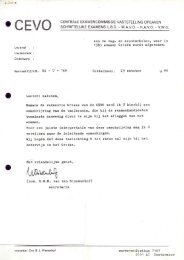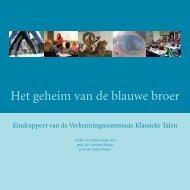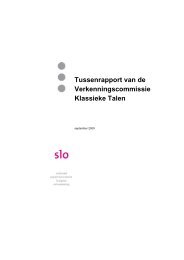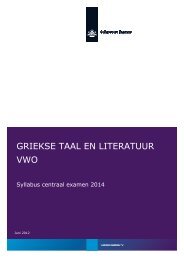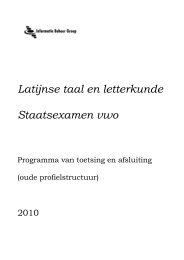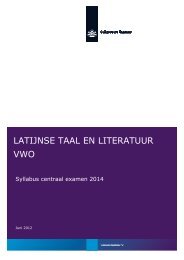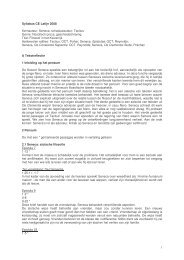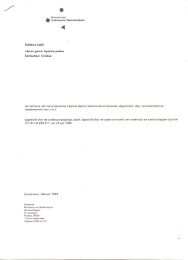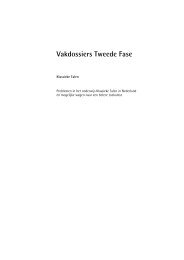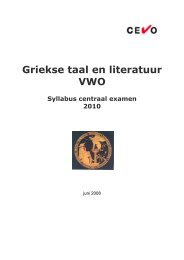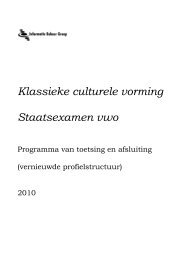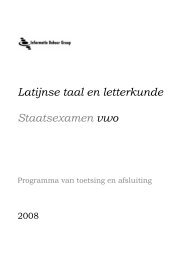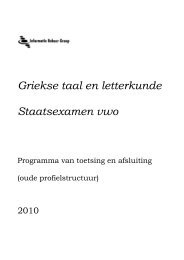Rome Wasn't Digitized in a Day - Council on Library and Information ...
Rome Wasn't Digitized in a Day - Council on Library and Information ...
Rome Wasn't Digitized in a Day - Council on Library and Information ...
Create successful ePaper yourself
Turn your PDF publications into a flip-book with our unique Google optimized e-Paper software.
227<br />
editor <strong>and</strong> a str<strong>on</strong>g board of respected digital humanists. Both these suggesti<strong>on</strong>s illustrate the<br />
importance of staff<str<strong>on</strong>g>in</str<strong>on</strong>g>g as a key comp<strong>on</strong>ent of any <str<strong>on</strong>g>in</str<strong>on</strong>g>frastructure.<br />
New Evaluati<strong>on</strong> <strong>and</strong> Incentive Models for Digital Scholarship <strong>and</strong> Publish<str<strong>on</strong>g>in</str<strong>on</strong>g>g<br />
While the ACLS report argued that young scholars would need to be offered more “formal venues <strong>and</strong><br />
opportunities for tra<str<strong>on</strong>g>in</str<strong>on</strong>g><str<strong>on</strong>g>in</str<strong>on</strong>g>g <strong>and</strong> encouragement” (ACLS 2006) <str<strong>on</strong>g>in</str<strong>on</strong>g> order to successfully pursue new<br />
digital scholarship, the CSHE report <strong>on</strong> scholarly communicati<strong>on</strong> practices found no evidence<br />
suggest<str<strong>on</strong>g>in</str<strong>on</strong>g>g that technologically sophisticated graduate students, postdoctoral scholars, or assistant<br />
professors were eagerly pursu<str<strong>on</strong>g>in</str<strong>on</strong>g>g digital publish<str<strong>on</strong>g>in</str<strong>on</strong>g>g opportunities <str<strong>on</strong>g>in</str<strong>on</strong>g> place of traditi<strong>on</strong>al venues. “In<br />
fact, as arguably the most vulnerable populati<strong>on</strong>s <str<strong>on</strong>g>in</str<strong>on</strong>g> the scholarly community,” Harley et al. imparted,<br />
“<strong>on</strong>e would expect them to hew to the norms of their chosen discipl<str<strong>on</strong>g>in</str<strong>on</strong>g>e, <strong>and</strong> they do” (Harley et al.<br />
2010, 9). Senior scholars who already had tenure were undertak<str<strong>on</strong>g>in</str<strong>on</strong>g>g most of the greatest digital<br />
<str<strong>on</strong>g>in</str<strong>on</strong>g>novati<strong>on</strong>, they discovered. The ir<strong>on</strong>y rema<str<strong>on</strong>g>in</str<strong>on</strong>g>ed, however, that young scholars were often expected by<br />
their senior colleagues to transform professi<strong>on</strong>s that would still as yet not recognize digital scholarship.<br />
A recent article by Stephen Nichols has also criticized this lack of support for both produc<str<strong>on</strong>g>in</str<strong>on</strong>g>g <strong>and</strong><br />
evaluat<str<strong>on</strong>g>in</str<strong>on</strong>g>g digital scholarship am<strong>on</strong>g the humanities:<br />
While attitudes more favourable to the needs of digital humanities projects are slowly evolv<str<strong>on</strong>g>in</str<strong>on</strong>g>g,<br />
we have yet to see a general acceptance of new approaches. Indeed, even where digital projects<br />
have been embraced, evidence suggests that attitudes from traditi<strong>on</strong>al or analogue scholarship<br />
c<strong>on</strong>t<str<strong>on</strong>g>in</str<strong>on</strong>g>ue to <str<strong>on</strong>g>in</str<strong>on</strong>g>fluence the way projects are evaluated, a practice that younger, untenured<br />
colleagues often f<str<strong>on</strong>g>in</str<strong>on</strong>g>d <str<strong>on</strong>g>in</str<strong>on</strong>g>timidat<str<strong>on</strong>g>in</str<strong>on</strong>g>g. At least as far as the dem<strong>and</strong>s of humanities credential<str<strong>on</strong>g>in</str<strong>on</strong>g>g<br />
are c<strong>on</strong>cerned, the dom<str<strong>on</strong>g>in</str<strong>on</strong>g>i<strong>on</strong> of the typewriter has yet to give way to that of the computer,<br />
metaphorically speak<str<strong>on</strong>g>in</str<strong>on</strong>g>g (Nichols 2009).<br />
This criticism was c<strong>on</strong>firmed by the research of the LAIRAH project (Warwick et al. 2008b), which<br />
illustrated that many scholars creat<str<strong>on</strong>g>in</str<strong>on</strong>g>g digital humanities projects had received little support or<br />
recogniti<strong>on</strong> from their <str<strong>on</strong>g>in</str<strong>on</strong>g>stituti<strong>on</strong>s. Further evidence of this trend was dem<strong>on</strong>strated by a workshop at<br />
the 2010 Modern Language Associati<strong>on</strong> (MLA) C<strong>on</strong>ference <strong>on</strong> assess<str<strong>on</strong>g>in</str<strong>on</strong>g>g digital scholarship <str<strong>on</strong>g>in</str<strong>on</strong>g><br />
n<strong>on</strong>traditi<strong>on</strong>al formats as detailed by Edm<strong>on</strong>d <strong>and</strong> Schreibman (2010). When the first case study at the<br />
MLA workshop presented a digital editi<strong>on</strong> of a little-known poet complete with extensive scholarly<br />
apparatus, the first comment from a workshop participant was that the creati<strong>on</strong> of such an editi<strong>on</strong> was<br />
not scholarship but service. This attitude was reflected throughout the CSHE case study of archaeology<br />
as well, <strong>and</strong> many archaeologists suggested that much digital work was a form of service, not<br />
scholarship. “The creati<strong>on</strong> of a scholarly editi<strong>on</strong> was a service activity, not a scholarly <strong>on</strong>e regardless<br />
of the medium of presentati<strong>on</strong>,” Edm<strong>on</strong>d <strong>and</strong> Schreibman reported, add<str<strong>on</strong>g>in</str<strong>on</strong>g>g that “the workshop<br />
facilitators immediately realized that the battle l<str<strong>on</strong>g>in</str<strong>on</strong>g>es were far from fixed <strong>and</strong> that hav<str<strong>on</strong>g>in</str<strong>on</strong>g>g a work <str<strong>on</strong>g>in</str<strong>on</strong>g><br />
digital form <strong>on</strong>ly served to re<str<strong>on</strong>g>in</str<strong>on</strong>g>force certa<str<strong>on</strong>g>in</str<strong>on</strong>g> exist<str<strong>on</strong>g>in</str<strong>on</strong>g>g prejudices rather than allow for a widened<br />
scholarly horiz<strong>on</strong>” (Edm<strong>on</strong>d <strong>and</strong> Schreibman 2010).<br />
One reas<strong>on</strong> that Edm<strong>on</strong>d <strong>and</strong> Schreibman (2010) suggested for the lack of “trust” <str<strong>on</strong>g>in</str<strong>on</strong>g> digital resources<br />
as real scholarship is that such resources are still perceived by many scholars as ephemeral <strong>and</strong><br />
transient. They proposed that the development of susta<str<strong>on</strong>g>in</str<strong>on</strong>g>able <str<strong>on</strong>g>in</str<strong>on</strong>g>frastructure for digital scholarship<br />
might help alleviate some of this distrust. In additi<strong>on</strong>, Edm<strong>on</strong>d <strong>and</strong> Schreibman po<str<strong>on</strong>g>in</str<strong>on</strong>g>ted out that even if<br />
the framework for pr<str<strong>on</strong>g>in</str<strong>on</strong>g>t-based scholarship was so “embedded <str<strong>on</strong>g>in</str<strong>on</strong>g> the academic <strong>and</strong> <str<strong>on</strong>g>in</str<strong>on</strong>g>stituti<strong>on</strong>al systems<br />
that support it as to be nearly <str<strong>on</strong>g>in</str<strong>on</strong>g>visible,” it was still an <str<strong>on</strong>g>in</str<strong>on</strong>g>frastructure <str<strong>on</strong>g>in</str<strong>on</strong>g> itself that many scholars had<br />
l<strong>on</strong>g s<str<strong>on</strong>g>in</str<strong>on</strong>g>ce realized was beg<str<strong>on</strong>g>in</str<strong>on</strong>g>n<str<strong>on</strong>g>in</str<strong>on</strong>g>g to break:



